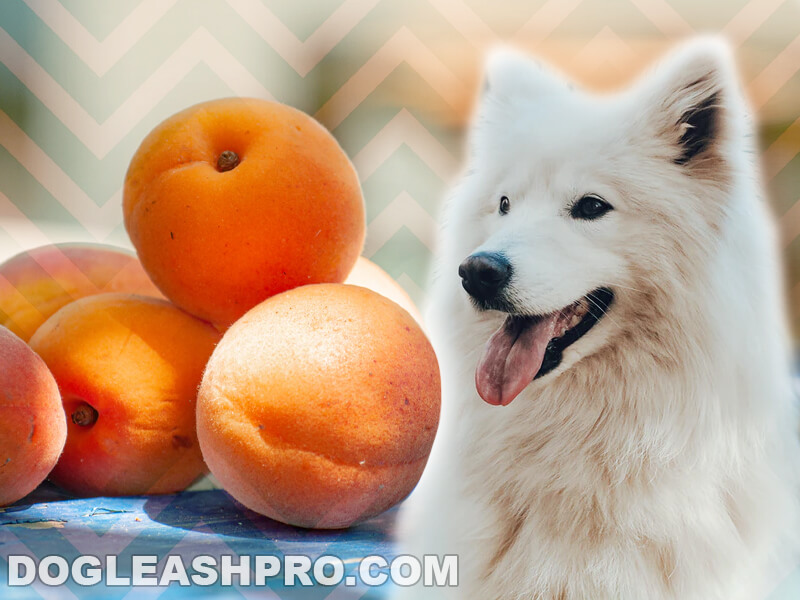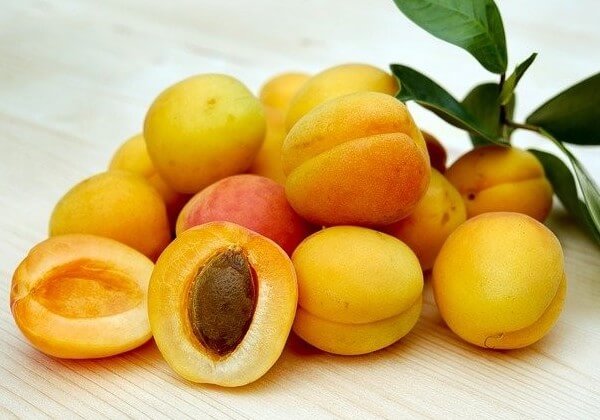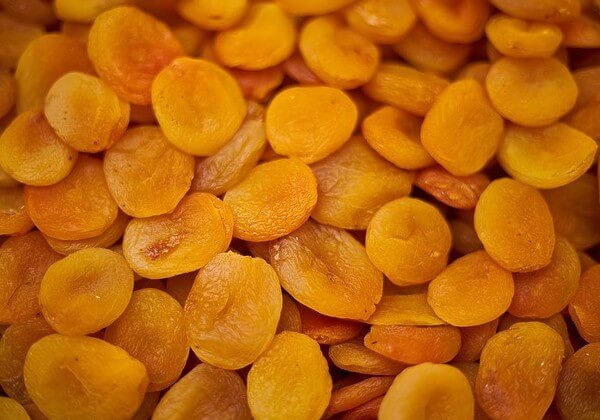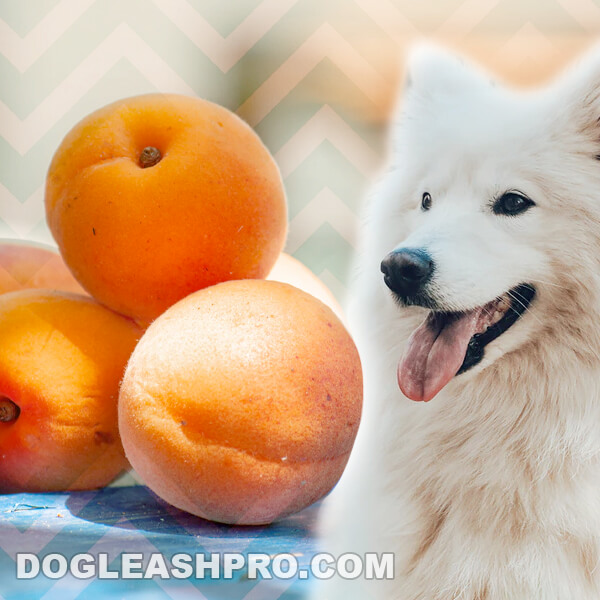
Our dogs love sweet juicy fruits so when I was eating Apricots this summer, they sat nearby and gave me those puppy eyes. Apricots are one of many drupe fruits. They have thin, delicate, and velvety skins with flesh that is juicy and dense and have a central stone that contains the seed.
Can dogs eat Apricots? Yes, dogs can eat Apricots in moderation if it is just the flesh of the Apricots and not the hard Apricot seeds or the stem of this fruit. Apricots are packed full of minerals, vitamins, and flavonoids that are beneficial to dogs. Proper preparation of this sweet fruit is crucial before feeding it to your dog.
Table of Contents
Can dogs have Apricots?

Yes, dogs can have Apricots in moderation if it is just the flesh they are eating. Can dog eat fresh Apricot? Yes, dogs can eat fresh Apricots in moderation. Let’s go over this fruit more in-depth and discuss why this sweet tasty fruit is great for dogs and when they are not safe for dogs.
Are Apricots good for dogs?
When prepared properly, Apricots can provide your canine friends with several health benefits. Although Apricots are small tiny fruit, they are packed full of the following that is beneficial to our furry friend’s health:
- Vitamins.
- Minerals.
- Fiber.
- Flavonoids.
Additionally, we highly recommend that dogs eat ½ to 1 Apricot. Let’s take a look at the nutritional profile of one fresh whole Apricot.
Nutritional profile of Apricot (1 Apricot)
| Name, Unit | Amount |
| Calories, cal | 17 |
| Sugar, g | 3 |
| Sodium, mg | 0 |
| Carbohydrate, g | 4 |
| Total Fat, g | 0 |
| Cholesterol, mg | 0 |
| Protein, g | <1 |
| Fiber, g | 1 |
Skin and flesh of Apricots contain soluble fiber which promotes healthy digestion in dogs
Both the flesh and skin of the sweet Apricots contain a good amount of soluble fiber. Soluble fiber is great for dogs because it helps contribute to the growth of healthy good bacteria in the dog’s gut and promotes the healthy growth of colonic cells.
Eating a small amount of Apricot can help improve your pup’s overall digestive health. Also, soluble fiber absorbs water so it helps to make the dog’s stool more firm and formed. This way, your furry family member has an easier time doing his or her business. If your four-legged friends have diarrhea, try feeding them a slice or two of Apricot.
Vitamin A, C, and E in Apricots promotes a healthy immune system and overall well-being in dogs
This orangish-yellow fruit is considered very nutritious to our canine friends. It is packed full of vitamins A, C, and E.
- Vitamin A provides your dog with healthy eyes and good vision.
- Vitamin C in Apricots promotes a strong immune system in dogs.
- Lastly, the vitamin E in Apricots metabolizes fats and is a fat-soluble that is essential for a strong immune system, healthy heart, coat, and skin, strong muscles, nerve cell membranes, and liver in dogs.
Did you know… Plums also have high sugar content so are they safe for doggy consumption? Check out Can Dogs Eat Plums? to find out!
Beta carotene in Apricots slows down the aging process in dogs
Apricots have an orange-red pigment so it’s not surprising that Apricot contains a compound called beta carotene. Beta carotene is an antioxidant that prevents infection and disease in dogs.
Additionally, it can stop oxidative damage to your furry friend’s cells and slow down the aging process in dogs. When your canine friends ingest fruit like Apricots that contain beta carotene, it gets converted to vitamin A inside their bodies and all dogs need vitamin A.
Fun Fact: Purple dragon Fruit has high beta carotene content which is great for your dog’s eyesight. Check out Can Dogs Eat Dragon Fruit? to find out if Dragon Fruit is safe for doggy consumption.
Are Apricots bad for dogs?
However, with all that healthy goodness, Apricots can be bad for dogs. If your K9 friends eat too many Apricots, they are at risk of consuming too much sugar and fiber and both of these can lead to vomiting or diarrhea as well as other short-term and long-term health issues such as weight gain, dental issues, arthritis, and even pancreatitis.
This is why moderation is key. If it is a one-off situation, your pooch may get temporary diarrhea and will be fine after a few days. It’s important not to overfeed your pup too many Apricots every day.
Another reason why Apricots can be bad for dogs is that the Apricot pit or stone which contains the seeds can be a choking hazard for dogs. This is why proper preparation is vital. So, if you’re wondering, “Can dogs eat Apricot seeds?” the answer is no. Dog owners should remove the Apricot pit or stone first before feeding the flesh to their canine friends.
Not only is the Apricot pit a choking hazard, but it can also cause intestinal and bowel blockage. In severe cases, emergency surgery may be required.
Are Apricot seeds bad for dogs and are Apricot seeds poisonous to dogs? Yes, Apricot seeds are harmful to dogs. The Apricot stones contain a harmful chemical called cyanide. When dogs chew the Apricot stones accidentally, the cyanide poison gets released from the stones. Your dog’s body will then absorb the poison and are at risk of several illnesses.
If you have a medium to large dog, they may be fine, but if you have small Chihuahua dogs, it can put them at high risk. So if you plan to feed your pups Apricot, make sure to remove the pit or stone first.
So, are Apricots poisonous to dogs? The flesh of the Apricots is safe for dogs to eat and can provide tons of health benefits to dogs, but the Apricot pits or stone as well as other parts of the Apricot plant are poisonous to dogs since they contain cyanide among other chemicals that are harmful to dogs.
All plants in the Prunus family such as plum plants, nectarine plants, peach plants, and cherries plant are poisonous to dogs. However, the flesh of the fruit is safe for doggy consumption.
This means if you are growing an Apricot tree, make sure it is out of your dog’s reach. Have a fence around this Apricot tree to prevent your dogs from chewing on the leaves, stems, or stones. Make sure your pup isn’t able to help themselves to fallen Apricots from the tree either. Keep in mind that fruits like Apricots will ferment once they fall from the tree and this can cause intoxication in dogs.
If your canine family member ate the whole Apricot fruit, be sure to consult with your vet right away and in the meantime observe him or her closely for any initial negative reactions. Ask your vet if you should bring your dog in for an examination since a whole Apricot fruit can cause intestinal or bowel blockage.
You might also like: My Dog Has Diarrhea But Is Acting Fine
Can dogs eat dried Apricots?

Yes, dogs can eat dried Apricots because dried Apricots are usually destoned so they are safe for canine consumption. So, are dried Apricots good for dogs? Usually yes, dried Apricots are good for dogs in moderation.
But can there be situations when dried Apricots are bad for dogs? If you’re wondering, “are dried Apricots bad for dogs?” the answer is yes, there are cases when dried Apricots are bad for dogs.
This is why it’s important to always check that the dried Apricots don’t have any stone or pit in them. Since dried Apricots are harder for dogs to chew, be sure to cut them up in small bite-sized pieces before feeding them to your dogs.
Dried Apricots are just as sweet as fresh Apricots so moderation is key. Eating too many dried Apricots can lead to too much sugar consumption.
Also, some dried Apricots may have added sugar, flavors, or preservatives. If this is the case, do not feed your dogs dried Apricots. Too much sugar can cause weight gain, some flavors may be toxic to dogs, and preservatives only keeps the dried Apricots fresh but it is harmful to your dog’s health.
Avoid feeding your four-legged friends dried Apricots that are mixed with other dried fruits. Many dried mixed fruits contain raisins, currants, and sultanas which are all toxic to dogs.
Can dogs have dried Apricots?
As we can see, dogs can definitely have dried Apricots in moderation. However, it’s important to keep in mind that there should be no added sugar, preservatives, or flavors on them before feeding them to your dogs.
Can dogs eat Apricot jam?
Yes, dogs can eat Apricot jam as it is not toxic to dogs. However, there is usually a ton of sugar in Apricot jam that is considered unhealthy for dogs. Before you allow your furry friends to have some Apricot jam, check to see how much sugar is in it.
Too much sugar consumption can lead to weight gain, dental issues, diabetes, hyperactivity, and even pancreatitis.
But be careful of Apricot jam that’s labeled sugar-free because those can be even more dangerous to dogs than regular Apricot jam since sugar is usually replaced with xylitol which is extremely toxic to dogs.
Can dogs eat Apricot yogurt?
Yes, dogs can eat Apricot yogurt in moderation. If the Apricot yogurt has a high sugar level, one or two spoonfuls of Apricot yogurt should be fine for dogs, but no more than that.
Sometimes Apricot yogurt could be mixed with other fruits that may not be safe for dogs like grapes, so if this is the case, avoid feeding your dog Apricot yogurt.
While we may enjoy Apricot yogurt, it may not be the best for our furry friends and fresh Apricot or naturally dried Apricot yogurt may be the best option.
Can dogs eat Apricots safely?
Before you feed your canine friends Apricots, make sure to prepare them properly. You’ll want to remove the Apricot pits or stone first and only allow your furry friends to eat the sweet flesh. Dogs can safely eat a few slices of Apricot flesh every now and then.
Too much Apricots and your canine friends may be at risk of health issues such as diabetes, weight gain, dental issues, and pancreatitis.
So, can dogs eat Apricots?
Your furry friends can definitely eat Apricots in moderation and should only eat the flesh of this sweet fruit. Dogs should avoid the pit or stone at all costs as it can become a choking hazard and get lodged in the intestines causing intestines or bowel obstruction.
Our dog’s health and safety is our number one priority and for that reason we should be careful with what we give our pups even if the fruit is considered safe.
DISCLAIMER: THIS WEBSITE DOES NOT PROVIDE MEDICAL ADVICE
The information, including but not limited to, text, graphics, images and other material contained on this website are for informational purposes only. No material on this site is intended to be a substitute for professional veterinary advice, diagnosis, or treatment. Always seek the advice of your veterinarian or other qualified health care provider with any questions you may have regarding dietary needs.
Resources:
https://en.wikipedia.org/wiki/Apricot
https://pubmed.ncbi.nlm.nih.gov/14658721/

With over five years of specialized experience as an animal writer, my expertise lies in dog nutrition, health, behavior, grooming, and training. I am dedicated to delivering helpful and informative content that caters to the well-being of our furry friends. My primary goal is to empower pet owners with knowledge and ensure our canine companions thrive in health and happiness. In my free time, I love volunteering at local dog rescue centers.







